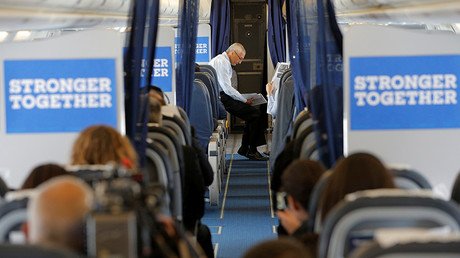’Hard choices’ on TPP: Clinton campaign emails reveal trade pact pains
Emails published by WikiLeaks show the struggle among Hillary Clinton’s campaign staff to stake out a position on Trans-Pacific Partnership (TPP), the controversial trade deal championed by the Obama administration but opposed by trade unions and Bernie Sanders.
In March 2015, the White House was pushing for a congressional vote on the Trade Promotion Authority (TPA), which would enable President Barack Obama to “fast-track” the TPP negotiations. Many Democrats had reservations, however, since their traditional support base among the labor unions was vocally opposed to the secretive trade pact.
Because Clinton said that the TPP “sets the gold standard in trade agreements,” during a 2012 visit to Australia as secretary of state, her campaign staff appeared eager to find a way to walk the comments back without actually doing so.
‘Straw man’
“Do we think this thing is actually going to move – or can we just hang back?” Robby Mook, Clinton’s campaign manager, asked in a March 21 email. “If we do think it's moving, do we want her to announce her support via letter before we announce the campaign so we can press ‘reset’ with labor during announcement?”
Jake Sullivan, Clinton’s top foreign policy adviser, suggested throwing out a “straw man” about how her support for the deal would depend on its details:
“I want to make sure that trade legislation and trade deals look out for the middle class.”
Pollster John Anzalone then chimed in: “I just think the issue of ‘fair trade’ with normal folks goes in the category of the ‘deck stacked against them’ so I think we should be more protective of foul play in anything she says.”
‘So annoying’
On April 5, a week before Clinton announced her candidacy, Mook complained about the TPA to Jennifer Palmieri, who came over from the White House to be the campaign’s communications director.
“The timing is so annoying. Steps right on launch. Would be a shame to have labor booing her right out of the gate,” Mook wrote.
Palmieri assured Mook that there was no need to rush in drafting the campaign’s position on the TPP.
“On a 50-50 proposition, I come down on side of dysfunction. Seems to me the safer bet is that the senate doesn't get it together. So I would not be anxious to get that letter out this week – but let's discuss tomorrow,” she wrote.
‘Eating us alive’
On April 13, the day after the announcement, Sullivan laid out three possible approaches to the TPA/TPP, as proposed by campaign chairman John Podesta and him, Palmieri, and Mook, respectively.
“I am less concerned about historical blowback on her past position than this issue eating us alive for being on the wrong side and giving Progressives a real reason to try and push someone more weighty into the primary,” replied Anzalone.
“I say we suck it up and be as definitive as possible from the beginning that we don’t like these deals. We will be right with voters and right with labor. We get no integrity gold star for staying pure on this issue because of one line [in] friggin Hard Choices or because this is a key issue for a lame duck president,” Anzalone added in another message, referencing Clinton’s 2014 memoir.
“I’m for principle first, process second,” argued political consultant Jim Margolis.
“I know the boss won't be comfortable putting her foot down,” Mook replied to the exchange.
The discussion promoted pollster Joel Benenson to write that, “we clearly need a bigger strategic discussion about how to deal with labor as a constituency.”
'Holding statement' and media pushback
By April 16, however, the media began to demand Clinton make up her mind.
“I think we need a holding statement,” Palmieri wrote.
Speechwriter Dan Schwerin, who composed much of Hard Choices, responded with a long and short draft of Clinton’s position, amounting to “hold on TPA and set a high bar on TPP.”
“Hillary believes we should set a high bar for TPP and other future agreements, and only support them if they create jobs, raise wages, and advance our national security,” the proposed statement said.
The following day, Sullivan informed his colleagues that the Washington Post and Bloomberg had been inquiring about Clinton’s position.
“We seem to have two options if we're not going to (grudgingly) support,” he wrote. “Say its procedural and we're not weighing in. Grin and bear it through incoming,” or “Say we're studying and then oppose next week (giving White House time).”
Also on April 17, deputy press secretary Jesse Ferguson sought guidance from campaign spokeswoman Karen Finney.
“We punted WSJ/NYT last night, but now have LAT and FOX News looking for position on this stuff. Let me know if anything has changed,” Ferguson wrote,referring to the Wall Street Journal, the New York Times, and the Los Angeles Times.
Finney replied by sending Ferguson an article from The Nation, written by John Nichols, who actually argued that Clinton should embrace a hard choice – referring to the title of her memoir, discussed by the pollsters and staff just days earlier.
“Instead of sticking with Obama, stick with principles she embraced a senator,” Nichols wrote.
On April 30, Vermont Senator Bernie Sanders announced he would also seek the Democratic nomination, running on a platform openly opposed to the TPP.
Congress finally passed the TPA on June 24, 2015. The TPP was drafted in October that year and signed in February 2016. It has not yet come into effect, however, as the Republican majority in the Senate has declined to put it up for a ratification vote.













